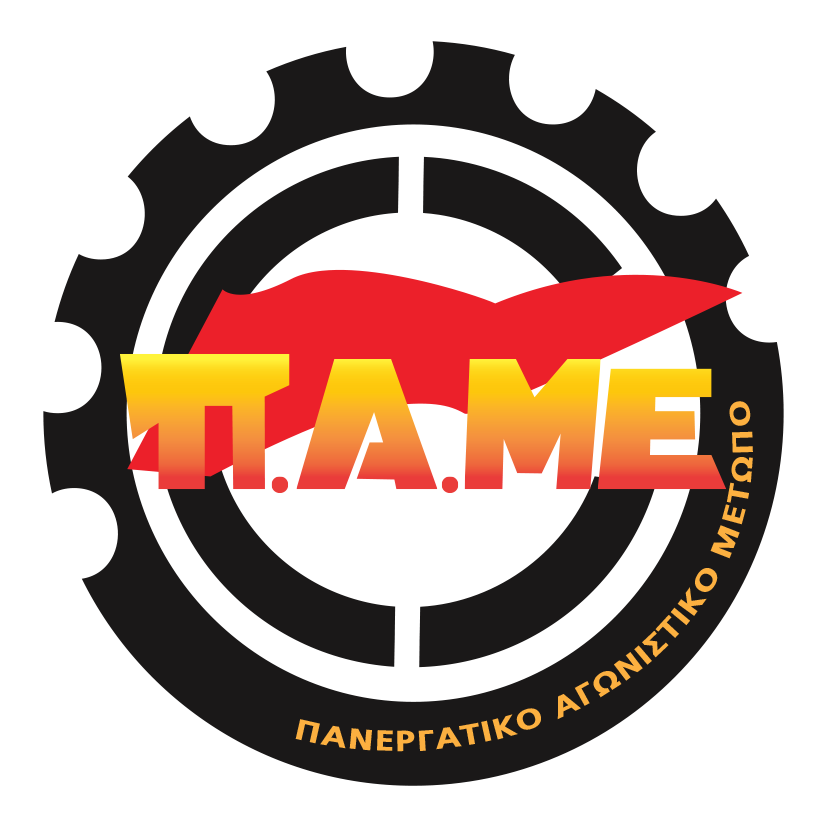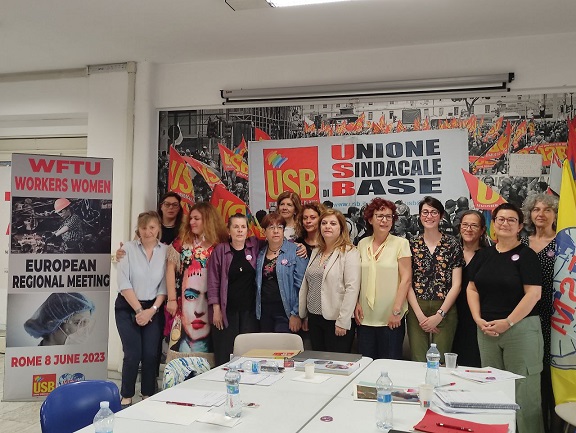Working Women’s WFTU Meeting, Rome, June 2023
PAME salutes the millions of workers around the world who are in the streets of struggle. With huge strikes, multiform militant mobilisations, uprisings and demands on all continents. Great struggles for wage increases, against anti-worker attacks, against imperialist wars and interventions.
The working class once again confirms its inexhaustible power. The working class confirms once again that it is the class that pulls society forward and without us nothing moves!
We salute the great struggles of the workers in France, Italy, Greece, Britain, Sri Lanka, India, Peru, Brazil, South Africa and so many other countries of the world on all continents. Struggles and mobilisations in which the trade unions, members and friends of the WFTU have played a leading role. Struggles that give us optimism and perspective and it is important to note the action and participation of women workers, trade unionists without whom these struggles in many cases would not have existed.
At the same time, we want to note some key issues about the situation of women today. Capitalism, having a need for mass female labour, has given other characteristics to female inequality, somehow disguising it and at the same time showing its limited limits to offer substantial equality to working women. In the attempt of every working class and popular women to re-establish herself professionally and raise a family, it is revealed that “parity” and “equality” is a slogan of very limited value under capitalism.
On the ground of the material conditions of life and work of working women, and the mechanisms of manipulation of exploitative society, additional obstacles are formed for their stable participation in the class, political struggle. This is reflected in the lower degree of trade union organisation of working women compared to their male counterparts and the difficulty of appointing women to the leadership Boards of trade union organisations at all levels.
In contemporary capitalist society, female inequality is expressed in the generalised insecurity of working women, in the ‘flexibility’ of labour relations, in uninsured work, in high rates of female unemployment.
Moreover, working-class and middle-class women have not been relieved of the almost exclusive “individual responsibility” for the care of children, the elderly, the individual household.
The EU, capital, bourgeois governments, use the objective difficulties of combining work and motherhood in class-exploitative society to break down workers’ resistance and struggle against “flexible” labour relations, to overturn the fixed daily working time, resulting in intensification, greater exploitation. Scientific and technological development is exploited to completely overthrow permanent and stable work, to generalise “flexible” forms of employment to the entire workforce, women and men. The bourgeois staffs in the EU and in the capitalist states in general are exploiting all the possibilities for exploiting the pool of female labour force on terms that ensure the competitiveness and profitability of the business groups.
Under the cover of the anti-labour laws passed by all governments, whether right-wing – neoliberal or left-wing – social democratic, the intensification of work, especially in sectors with seasonal work, such as the food industry, tourism, etc., means for working men and women 10-13 hours of work, without a break. Standing and lifting heavy weights leads mathematically to serious musculoskeletal disorders.
Health and safety services in the workplace are poor or non-existent. There are neither studies nor measures to protect men and women from harmful factors in male and female fertility and lactation. Institutional protection of maternity and breastfeeding is rudimentary and often not even implemented.
At the same time, urban planning seeks to integrate wage-earning women in the context of class reconciliation. This is expressed by the notorious “quotas” recommended by the EU and solemnly adopted by the forces of social democracy and opportunism in the trade union movement, by the reformist and employer-government controlled trade unions, the ETUC and the ITUC which function as mechanisms of the business groups and bourgeois governments in the trade union movement. The “equality in the labour market”, the “equality in participation in trade union bodies and decision-making centres” that they invoke, detached from the class content, creates the illusion and the false image that the woman-worker and the woman-industrialist have common interests on the basis of gender!
“Peace and democracy cannot be achieved without full equality and inclusion of women” said Akiko Gono, ITUC President. “The trade union movement will redouble its efforts to ensure the inclusive nature of its own structures, programs and processes to achieve equal and equitable representation of women in its leadership.”
In essence, under the pretext of this “gender equality”, the offspring of which are the “feminist movements” and the notorious “feminist strikes” called by ITUC and the ETUC on 8 March, with positions that cultivate the unity of interests based on gender in opposition to united class interests, the necessary united class struggle of workers is separated. In this way, ultimately, these forces call on women to come to terms with the loss of rights, the labour jungle.
It is characteristic that ITUC, in its call for this year’s 8 March, speaks about the women of Iran, Ukraine but not about the women of Palestine murdered by Israel, the women of Cuba murdered by the US embargo, or the women of Europe whose lives are being destroyed by the EU’s measures and anti-labour directives. PAME’s statement on the recent Congress of the ETUC notes the same.
In the context of capitalist exploitation, with the same logic, the same forces present as an “achievement” the ratification of Convention 190 of the International Labour Organisation (ILO) “on the elimination of violence and harassment in the world of work” – in the preamble of which, in fact, the objective of “promoting sustainable enterprises” is mentioned – which serves as a “washing machine” for a series of anti-labour laws and provisions. For example, in Greece, it was included in one of the most emblematic anti-labour laws on the abolition of the 8-hour working day and trade union rights and freedoms, passed in 2021 in parliament by the neoliberal ND government with the support of essentially the social democrats of SYRIZA and PASOK. But thanks to our struggles, the class unions and the working class to fight it and leave it to a certain extent, until today, only “on paper”.
Hundreds of “work regulations” sprang up under this law with the content of “the elimination of violence and harassment in the workplace”, which in fact criminalized, as an expression of “violence”, any attempt to organize and rally workers in the workplace, any confrontation with the employer, while leaving the real employer violence, the violence of capitalist exploitation, out of the question, which is expressed in the intensification of work, flexible working hours as it suits the employer, fixed-term contracts, work through contractors, the dismissal of pregnant women or mothers, which is a “cost” for the employer, the threat of dismissal for anyone who stands up and demands it, the rudimentary health and safety measures at work, since these also “cost” the employer, etc. and so on.
The genuine class forces in the labour movement, the genuine class trade unions have had and have nothing to do with these disorienting and damaging theories, logics and practices for the working class.
However, despite the adversities and obstacles, the fact that capitalism has brought women en masse into production creates the conditions for them, like the working class as a whole, to realize and develop their weapons and power in order to overthrow the capitalist system.
The great class political and trade union struggles, which have written the most brilliant pages of the class struggle all over the world and bear the indelible mark of the participation of working class and popular women, show us today theway out.
The rise of the participation of working women in the struggle illuminates the need to put the whole of contemporary social needs at the centre of the content of the unions’ action.
The class-oriented trade union movement needs to focus on the knowledge of the working conditions of working women and men and aim its action at halting the inhibiting effect of the inequality of women in their contemporary context.
The strength of the labour movement is closely linked to the number of women who decide to enter the struggle, to organise themselves in the union, to take part in its action, to go on strike, to become organisers of the struggle based on the needs of themselves and their families. From their own will and action, from their participation, depends the change of the negative correlation of power between the working class and the bourgeoisie, the detachment of working – people’s forces from the logic and plans of the capitalists and their political – trade union supporters. This means reorganising the workers’ movement, with the participation of women. To become more massive and decisive in the conflict, the break with the interests of the capitalists, the state and their alliances.
Working women need to put the stamp of their participation in the union, with modern social needs as their compass. A scope of action that is not delimited by the aspirations of the bourgeoisie and their staffs, but by their class interest.
Therefore, the effort of the class-oriented trade union movement to elaborate and fight for Class Collective Agreements, based on the specific social needs of women, based on their role in the reproductive process, takes on particular importance.
The militant demands for the modern rights of working women illuminate that the current level of labour productivity, scientific and technological development, can ensure to all and sundry permanent and stable employment, full labour and insurance rights, health and safety measures in the workplace, adapted to the specific needs of the female organism.
The draft Collective Agreements reflect the demand to put an end to broken and rolling working hours, to the “flexibility” of labour relations, which breaks up family and personal life. Today it is possible for all women to have fixed working hours, guaranteed by the Collective Labour Agreement, with reduced hours for women with disabled children and for single-parent families. Working women should be able to rely on modern services within the framework of a single, state-run and exclusively free health and welfare system, with social infrastructure for pre-school education, for the creative occupation of children, for special education, for the scientific care of the elderly.
The current centres of resistance, internationally, the struggle of the class trade unions against the imperialist war in opposition to those who “wash it out” together with the imperialist organisations of NATO and the EU (see. The strike struggles and mobilisations for modern needs, which have several examples of decisive contributions of working women to show, can be a source of inspiration for all working women to organise and strengthen the class-oriented struggle in the trade unions.
The forces that call on workers to become applauders of one government or another, of one imperialist alliance or another, of one saviour or another have the common goal of inactivating workers. To passivate us and to undermine our fighting mood.
Against them, workers’ struggles are developing all over the world. The unions that integrate women workers in their action, that women workers with their unions play a leading role in demanding their modern rights, that take the situation into their own hands, from better positions can claim the overthrow, the blocking of the anti-labour policies. Winning wage increases and other necessary demands and claims.
The militant trade unions need to highlight this direction, the perspective of class struggle. To expose the dangerous role of the ETUC and “movements” for women and for capitalist, green development. In this direction it is necessary to strengthen initiatives, coordination, solidarity.
Women’s Secretariat of PAME


